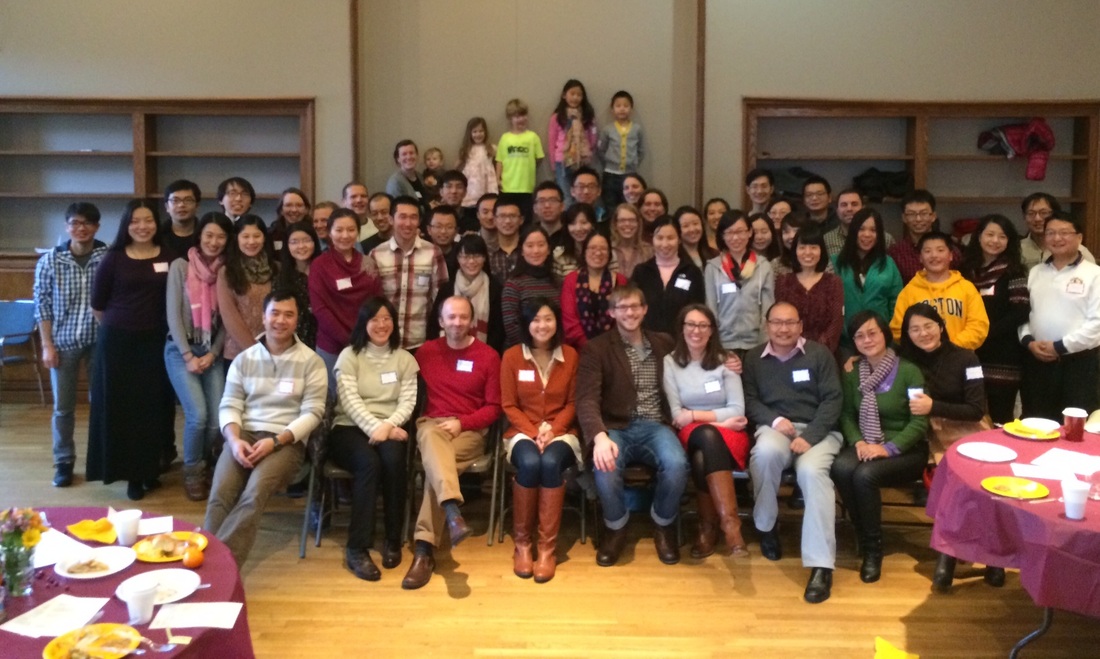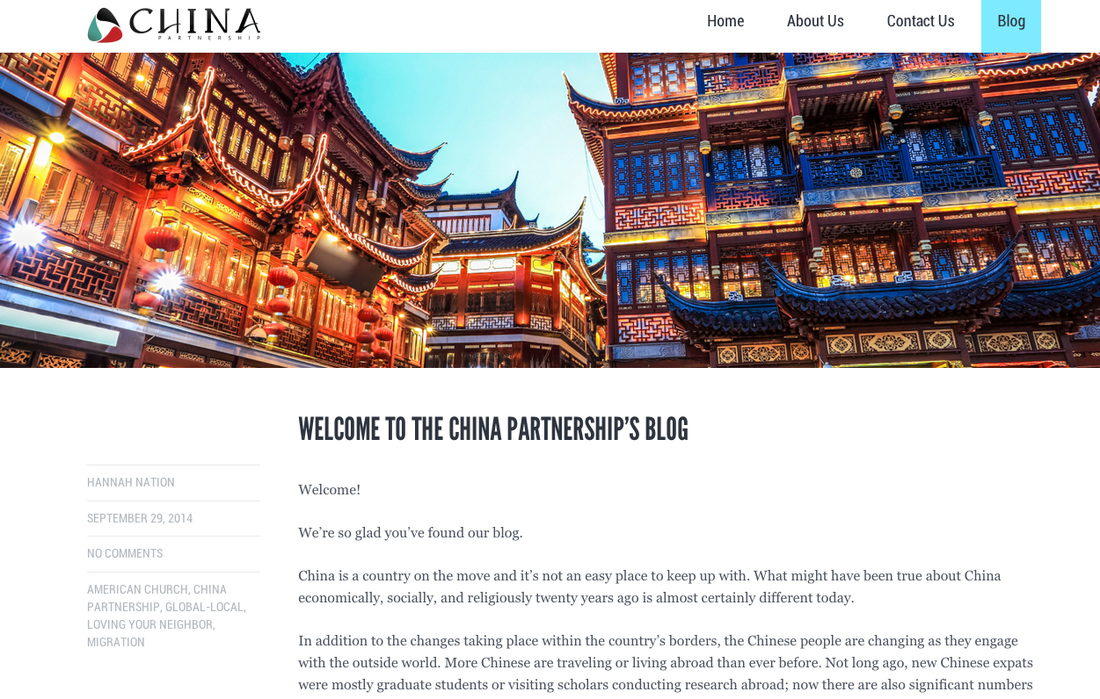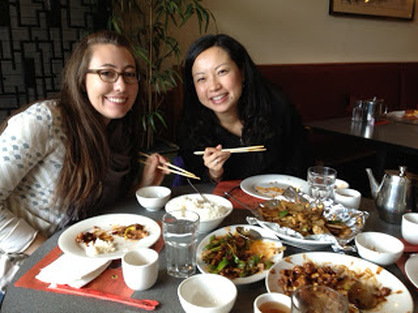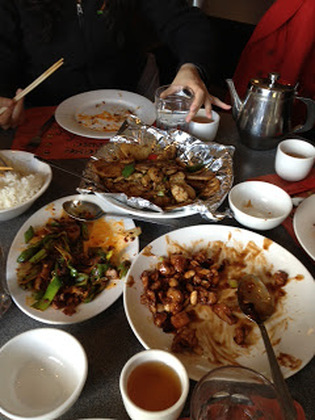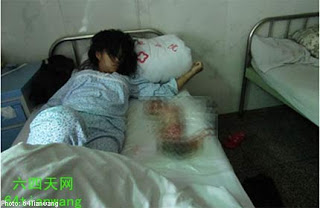|
This was my day. Hosting a Thanksgiving meal for 70 Chinese and Americans to come together in fellowship.
And this is why I'm not writing a full-blown post tonight. Instead, I'm spending my evening eating sushi on the couch and zoning out while the candles flicker. Later I'll go see Katniss kick butt in Mockingjay. To understand why today was so important, though, check out something I wrote on last week for another blog that I edit - A Matter of the Heart: Reflections on How America Celebrates Thanksgiving. Happy early Thanksgiving! ~Hannah
0 Comments
Hey everyone! Check out this new project I'm helping with - www.chinapartnership.org/blog. We're starting up a new blog on China and its church as well as global-local ministry in the US. Still working out a lot of kinks with with site, but I think it's going to develop into something really good in the coming months. We'll be fully launching in January! ~Hannah Click the picture to read my introduction to the blog!
Pictures of our recent trip are up! These are people and places we love dearly. Hope you enjoy... ~Hannah "Now Peter and John went up together to the temple at the hour of prayer, the ninth hour. And a certain man lame from his mother's womb was carried, whom they laid daily at the gate of the temple which is called Beautiful, to ask alms from those who entered the temple; who, seeing Peter and John about to go into the temple, asked for alms. And fixing his eyes on him, with John, Peter said, 'Look at us.' So he gave them his attention, expecting to receive something from them. Then Peter said, 'Silver and gold I do not have, but what I do have I give you: In the name of Jesus Christ of Nazareth, rise up and walk.' And he took him by the right hand and lifted him up, and immediately his feet and ankle bones received strength. So he, leaping up, stood and walked and entered the temple with them - walking, leaping, and praising God. And all the people saw him walking and praising God. Then they knew that it was he who sat begging alms at the Beautiful Gate of the temple; and they were filled with wonder and amazement at what had happened to him."
In a very short while, I will return to a place I once knew. I loved this place dearly and most often remember it with nostalgia. But when I am honest with my feelings, I remember primarily that this was the place where I learned about suffering. I learned about suffering there in many ways. I suffered in relationships. I suffered in pride. Mostly, I suffered physically as the billowing pollution squeezed my lungs and besmirched my face. But in addition to these personal sacrifices, I witnessed the painful, blatant, and twisted suffering of others. This was in itself its own kind of suffering. The suffering of others was visibly present every day, from the elderly trash collectors who had been pushed off their land to the mangy dogs who scrounged for food until they wound up dead in the streets. These things, however, were commonplace. These were the things that after the first few weeks ceased to cause me inner turmoil or distress. They wove their way into the fabric of society the way many of Dickens' most pathetic characters find their own important places within the narrative. These things were wrong and broken, but they seemed to have their place. But there was one place where the suffering was so great and so visible that it continues to haunt me. If I used the bus to make my way downtown, I had to get off at a particular stop and cross a bridge to enter into the shiny wealth of the city's finest shopping mall. Upon exiting the bus, I would start to walk quickly, holding my breath, trying to mentally prepare for the sights that awaited me. The bridge always contained beggars, and it always contained some of the most pitiful the city had to offer. All were maimed, most with their eyes gauged out. Some had been burned so wretchedly that they looked like living mummies. They sat in silence, often perfectly still, simply waiting for benevolence to find them. I was told early on that most of them had a pimp, Slumdog Millionaire style, and that giving them money would be fruitless. One day, I passed a man kowtowing violently against the sidewalk. A mixture of drool, sweat, and blood flowed from his head as he methodically beat, beat, beat his brow against the cement pavement. A crowd had gathered around him to watch, but no one acted to stop him. No one moved, they simply just gazed in silence as he begged for their assistance. In the power of such ensnaring suffering, I felt completely powerless. I didn't speak the language, and I couldn't cause disturbances of the "peace." For the duration of my walk across the bridge, I shared physical space with these people, but the chasm that spanned my plenty and their need seemed as big as the whole earth. The barriers which separate people are often larger than space; the languages, systems, governments, alienation, gender, and myriad other issues stared me in the face and pointed at my inadequacy to bless, to heal, to comfort, to bring justice. The more frequently I walked across the bridge, the more my soul screamed at God. I started to pray when I passed them by - internally mournful, screaming prayers. It was the only thing my mind could latch onto as the panic arose within my soul. One day I remembered the above passage from Acts. There was no way for me to do anything for the beggars - or was there? I started to consider whether I truly thought prayer was "doing something." When I, a child of God, am in the presence of suffering and pray, do I understand that I am actively at work? Is my understanding of prayer, of God, of myself as joined to Christ full enough to believe that when I pray, I am not being passive? According to scripture, is prayer not the most aggressive thing I could do? Like Peter and John, I looked at these humans living in terrible suffering and I understood that my hands were tied. But, my status before the Redeemer is not hindered by the evils of the world and so I prayed. These are the reflection that regularly got me across the bridge, but now, as I contemplate returning, I've begun having doubts. Yes, prayer is the primary weapon against evil, and yes, it was a good response to what I witnessed. But to my sorrow, I have realized that I never looked these people in the eye. In my rush to get across the bridge and in my desperation to deal with the turmoil in my soul, I really was still primarily focused on myself. I prayed for their deliverance because I felt uncomfortable. I rushed across the bridge because I didn't want to feel the pain. I never made eye contact because the possibility of making a connection was a degree of terrifying my mind couldn't hold. One of the most striking phrases in the above passage is the sentence, "And fixing his eyes on him, with John, Peter said, 'Look at us.'" This description of the connection between Peter and the beggar is terrifying. Who has this kind of confidence when dealing with the brokenness of the world? Who dares to look suffering in the eyes and request that it look back? I can't image what results would ensue from consistent interactions such as this one. I shrink from asking myself what might have come about if I had truly looked at the suffering on the bridge. I don't know what would have happened. But I know it would have challenged both me and those begging. Right now, I am afraid of returning. I am really afraid of being confronted once again with the degree of suffering found in the world. But mostly, I think I'm afraid of myself. I'm afraid of how I respond. Will I rush across the bridge or will I look into the eyes of those who live a life I cannot fathom? Am I more afraid of the first, or of the unknown answer to the latter? I do not know. ~Hannah This past weekend inspired some more additions to the list of 50 things I like about Boston. Enjoy!
11. Reuniting with old friends from China now living in Boston. 12. Sichuan Gourmet in Brookline. The first restaurant I've visited outside of China's borders that serves LEGIT 川菜, including but not limited to amazing 回锅肉,real 空泡鸡丁,and hold your breath my dear friends... 烧烤!!!!!! Apart from water chestnut and baby corn in the 烧烤, I would not have known I was in Boston. 13. The autumn leaves and beautiful sunny days. Boston in the fall really is great. 14. Our futon (since it has hosted many friends in the short time we've been here!) 15. A job that propels me to worship with my Chinese brothers and sisters at their local churches. ~Hannah "Have women ever really been suppressed in China, I often wonder? The powerful figure of the Empress Dowager immediately comes to my mind. Chinese women are not the type to be easily suppressed. Women have many disadvantages, have been prevented from holding stenographic positions or judicial posts, but women have ruled nevertheless in the home, apart from those debauchee households where women have become toys. Even in these homes, some of the concubines manage to rule their lords.
And what is still more important, women have been deprived of every right, but they have never been deprived of the right to marry. To every girl born in China, a home of her own is provided. Society insists that even slave-girls should be married off at a proper age. Marriage is women's only inalienable right in China, and with the enjoyment of that right, they have the best weapon for power, as wife and mother. There are two sides to this picture. Man has undoubtedly been unfair to woman, yet it is interesting to see how sometimes woman has her revenge. The total effect of the subjection of women consists in the general recognition of the inferiority of women, in women's self-abasement, in their deprivation of the social advantages of the men, in their lesser education and knowledge, in their cheaper, harder and less free lives, and in the double sex standard. The oppression of women is more the invisible sort, resulting from the general recognition of their inferiority. Where there is no love between husband and wife, the husband may be very autocratic, and in such cases the wife has no other recourse but submission. The women merely endure family autocracy as the Chinese people endure political autocracy." My Country and My People, Lin Yu Tang, 1935 Does anything change in this world? While trying to slog through My Country and My People last night, I read the above paragraphs, horrified by the snobbish few of women's travails in China that Lin Yu Tang takes. As he tries to explain and defend his culture to the West, his own arrogance and misogyny is revealed. With his words still rattling through my head, I read two very sad articles today revealing that nothing has changed in China. The first looks at the recurrent attempt by failing Chinese leaders to blame their worse deeds and ultimate demise on a "dragon lady" - a common slight of hand trick that has existed throughout Chinese history to paint women closest to the scene of political intrigue as overly sexual, conniving, trouble makers in order to hide where blame ultimately lies. The second looks at the story of one woman's forced abortion currently taking Chinese media by storm and discusses the ins and outs of China's one child policy. What links them together? Despite almost a century of social upheaval, Lin's words are as true today about Chinese women as they were at the beginning of the last century. Marriage is women's only inalienable right in China... "the oppression of women is more the invisible sort, resulting from the general recognition of their inferiority." China believes itself to be a liberalized society, but it's exactly this assumption that will keep it from rising above its discriminatory past and present. Change cannot happen until China is willing, as a collective society to drop the arrogant platitudes concerning change and take a long hard look at the invisible, underlying, and completely prevalent attitudes it has towards its women. Please read these articles and pause to reflect for a moment on the needs of your sisters. Their greatest need is for a worldview change to rip throughout China from top to bottom and back up again. ~Hannah While living overseas, I somehow accidentally signed up for a free subscription of The Economist using frequent flyer miles. My mom faithfully saved every issue for me to read when I retuned after two years, so recently in an effort to purge my room of junk, I sorted through the stack of magazines, saving a select few while pitching the rest.
Two copies piqued my interest. One issue blames motherhood for gender inequality in the workforce (yes, a blog post will be coming on the article once I've fully digested it and formulated my response). The other issue's cover labels its topic as "Gendercide: What happened to 100 million baby girls?" While living in Asia, I had heard from word of mouth that the gender ratio was far off balance due to the traditional preference for boys, but I never researched it myself. I was excited to finally read about it, even though the article was a good year and a half old. This seemed like the perfect place to share the article. I can't imbed the article, so you need actually follow the link (gasp!). But as a quick taste and incentive to inform yourself concerning this issue, I've copied the first couple of paragraphs below. Read the rest at Gendercide: The worldwide war on baby girls | The Economist. "XINRAN XUE, a Chinese writer, describes visiting a peasant family in the Yimeng area of Shandong province. The wife was giving birth. “We had scarcely sat down in the kitchen”, she writes (see article), “when we heard a moan of pain from the bedroom next door…The cries from the inner room grew louder—and abruptly stopped. There was a low sob, and then a man’s gruff voice said accusingly: ‘Useless thing!’ “Suddenly, I thought I heard a slight movement in the slops pail behind me,” Miss Xinran remembers. “To my absolute horror, I saw a tiny foot poking out of the pail. The midwife must have dropped that tiny baby alive into the slops pail! I nearly threw myself at it, but the two policemen [who had accompanied me] held my shoulders in a firm grip. ‘Don’t move, you can’t save it, it’s too late.’“‘But that’s...murder...and you’re the police!’ The little foot was still now. The policemen held on to me for a few more minutes. ‘Doing a baby girl is not a big thing around here,’ [an] older woman said comfortingly. ‘That’s a living child,’ I said in a shaking voice, pointing at the slops pail. ‘It’s not a child,’ she corrected me. ‘It’s a girl baby, and we can’t keep it. Around these parts, you can’t get by without a son. Girl babies don’t count.’” ~Hannah 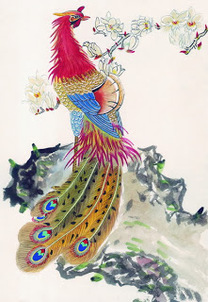 Recently, I’ve developed an interest in mythology as the imaginative representations of cultural beliefs and ideals. Beautiful pictures and stories from across the globe fascinate me, but currently, none more than the myth of the Fenghuang, or Chinese “phoenix”. Due to millennia of Fenghuang mythology, the creature’s symbolism is sometimes conflicted. But here is what I’ve gathered and why I think it matters for contemporary American women… The Fenghuang is part of ancient Chinese cosmology and was responsible along with three other mythological creatures for the creation of the world. After these creatures had created our world, they divided it into four sectors of north, south, east, and west, each taking dominion over one. The Fenghuang’s domain was the south and as a result, the summer. This mythological creature’s body symbolizes the six celestial bodies with its head as the sky, eyes as the sun, back as the moon, wings as the wind, feet as the earth, and finally, tail as the planets. The actual physical appearance of the Fenghuang is a composite of many different animals. The creature is made up of the beak of a cock, the face of a swallow, the forehead of a fowl, the neck of a snake, the breast of a goose, the back of tortoise, the hindquarters of a stag, and the tail of a fish. This sounds like quite the odd looking creature to me, but interestingly enough, artistic depictions of the Fenghuang never seem to show the bird’s described physical make-up. Instead it is depicted as a beautiful and graceful composite of many bird varieties, most often with a peacock tail with feathers made of the five fundamental colors black, red, green, white, and yellow (corresponding to the five elements of water, fire, wood, metal, and earth). In China’s most ancient mythology, the Fenghuang was actually two birds united together. Feng represented the male entity and huang the female. United together to create the Fenghuang, they were a metaphor of the yin and yang, as well as the sacred union of male and female. Used to symbolize peace and harmony, the Fenghuang was said to appear only at the beginning of a new era or at the ascension to the thrown of a benevolent ruler. More recently in China’s long history, though, the Feng and Huang have been merged into one female creature, the Fenghuang, so that the ancient mythological figured could be paired with the male dragon as a symbol for the empress and emperor. In more recent centuries, the dragon and phoenix are often seen paired together as a symbol for marriage and unity. What draws me to the Fenghuang is a particular ancient description of its symbolism. In the Shan Hai Jing (山海经), a classic of Chinese mythology, each part of the Fenghuang’s body symbolizes a word. The head represents virtue (德), the wings represent duty (義), the back represents propriety (禮), the abdomen represents belief (信), and the chest represents mercy (仁). What a beautiful symbol for femininity! When I think about contemporary American culture, it’s hard for me to come up with any myths as deep symbols for femininity. We have larger than life caricatures of women as sex toys, power-hungry achievers, or spineless and wimpy prey, but there is a fundamental difference between myth and caricature. Caricature is based on what people perceive to exist. Myth presents what people want to be. The beauty of mythology is that it takes us beyond reality and gives us a chance to create an ideal. What does it say about us women if we do not have any collective symbols beyond our reality to remind us of what we hope to become? If I could pick a mythological symbol to inspire modern women, I would pick the Fenghuang. The creature flies with beauty and strength, ushering in times of peace and harmony. It is virtuous as it carries out its duty. Representing a life filled with belief (I would add, belief in something bigger than itself), the Fenghuang is marked by mercy and compassion. Lastly, the Fenghuang symbolizes propriety, a lost word in contemporary times. But the word has richer meaning than its surfaces usage. In addition to referring to manners of behavior, propriety means “appropriateness to the purpose or circumstances” and “rightness or justness.” Who could argue that justness and an understanding of one’s circumstances are a beautiful component of feminine ideals? I wish our society would dream again and intrigue us with its ideals. ~Hannah I just finished reading Chi An's A Mother's Ordeal and I couldn't recommend it more. During the first few chapters, I was bored with the typical tales of the Cultural Revolution. You can read a slew of other books, all full of horrible, dehumanizing descriptions of China's chaos. But by half way through, Chi An's tale grabbed me in the gut and I found myself waking up to an extremely personal admission of victimization and guilt unmatched by other such memoirs.
Chi An tells her story of growing up, finding a husband, and starting a family, all against the backdrop of China's population control policies. After suffering the cruel delivery of her first child and the forced abortion of her second, Chi An finds herself bitter and self-focused. Willing to do anything for the benefit of her own family and despite deeply suppressed ethical qualms, she takes charge of enforcing the One Child Policy within a local work unit. It is not until she accidentally becomes pregnant for a third time while living in the US with her husband that Chi An wrestles with her deepest longings and deepest guilt. The couple decide to fight to keep this new child alive and in the process are forced to separate all ties with their homeland. Better than any educated argument or theological belief, Chi An's words from the heart reveal a universal longing for life and the guilt that ensues when it is prematurely ended. Growing up in a world where logical and practical arguments for abortion abound, Chi An continues to be plagued by the human desire to conceive and bare children and when in the end, she becomes complicit in the forced termination of a generation, she and her colleagues suffer from nightmares, recurring sights and sounds, and emotional torment all oriented around the "little hands" that will come after them for justice in the next life. There is no reason Chi An should suffer from guilt considering the positive environment towards abortion in which she came of age, and yet something inside her refuses to accept the actions both committed against her and by her as innocent. What finally intrigued me most about her account lies within its closing chapters as Chi An retells her first experience with Catholicism. In a beautiful reflection on why people would worship a "dying God," Chi An simply and movingly describes the apologetics of the cross from an outside and Asian perspective. I am doubtful if Chi An took time to catch up on John Stott or Tim Keller's theology before writing down her thoughts on a couple pages (nonetheless predating Keller! ;-), and yet she sums up all of their grand arguments and thoughts through the layman's lens of a Chinese woman who has lived through hell and for the first time ponders what kind of God would be so real that no person could dream him up. And yet, Chi An falls short of reveling in the grace that lies waiting for her. She senses that there is a vast significant meaning to Christ's death, but she cannot find what it is. Instead, she finds redemption and hope through confession and a new calling in life to set right her imbalanced scales of justice. She declares to have found redemption, but she dares not hope to have found mercy and grace. The whole of A Mother's Ordeal is well worth reading, but if you never pick it up, at least read below. It will save you the gruesome operating table scenes, but fill you in on one woman's heart full of fear and hope. Fear of a Heavenly justice that she cannot understand and hope in the value of life that she has both betrayed and protected. "Two hours later, after I had been moved from the recovery room to a regular hospital ward, my baby was brought to me. As Wei Xin looked on, I stretched our my arms to take her from the nurse, suddenly aware of the significance of the moment. It was for the sake of this tiny human being that I had endured so many months of long-distance blackmail and personal torment. I drew my infant daughter close to me, thankful that Wei Xin and I had chosen to defy the authorities, exulting in our triumph. ..."'You are safe now, my little 'illegal' daughter,' I whispered. 'Whatever happens now, no one can ever take you away from me.' "By the time I returned from the hospital, the first article written by Steve about our case had appeared in Catholic Twin Circle magazine. It closed with an appeal for concerned readers to appeal the INS on our behalf. A surprising number did... "I was moved to tears of gratitude by these letters, even as I struggled to understand what had motivated their authors to write. Why should these people, strangers all, care what happened to us and our baby? What did they hope to gain from such an act? I had grown up in a culture where only people who knew you well - kinfolk, coworkers, classmates, or close neighbors - exerted themselves on your behalf, and even they expected favors in return. And yet hundreds of Americans from across the country had taken time to petition their government on our behalf. I did not know what to make of such generosity of spirit. 'The American people have good hearts,' Wei Xin and I told Steve wonderingly. "'Do unto others as you would have them do unto you,' Steve replied. 'Americans would not like to have their government forcing them to abort their unborn children,' he added, 'so naturally they sympathize with you.' "This 'Golden Rule,' as he told us it was called, had a familiar ring to it. The Analects of Confucius contained a similar precept: 'Do not do unto others what you would not have them do unto you.' But the more I reflect on the two formulations, the more I realized how different they in fact were. Confucius had merely forbidden people to wrong one another, not encouraged them to perform positive acts of charity. Living under such a rule, no wonder so many Americans had written letters on our behalf - and with no expectation of a return. "The awareness of what others were now doing for me convicted me anew of what I had earlier done to others. Not just once but a thousand times I broken both this new rule and its Confucian variant. I had done to other women what I did not want, and had finally not allowed, to be done to myself. The horror I had hoped to leave behind me in China came back to torment me anew. What good is your regret? I sneered at my reawakened conscience. How does it help the troubled and despairing women, now forever barren, whom you tortured, aborted, and sterilized? I abandoned myself to the care of my tiny daughter in the weeks following. Holding her in my arms, I could finally let go of the memory of the other little girl or boy who had been taken from me twelve years before. But the joy that my ‘make-up’ baby brought to me was not untempered by sorrow. She was both balm and wound, consolation and accusation, for her very presence seemed to speak to me of all those other children who were absent, who would never be. I had won my struggle to give birth, but how many hundreds of women had lost theirs? I was able to hold my daughter, but how many others would never hold theirs? What right do I have to this child, I thought bitterly, after what I have done? “One day Wei Xin, looking rather abashed, told me that he wanted to go to church. ‘I know that we were taught by the Party that all religion is superstition, but a lot of my friends at work go, and I would like to find out what it’s all about. Besides,’ he said wryly, ‘if the Communist Party is against it, maybe we should be for it.’ “Wei Xin’s suggestion came out of the blue. There were no Christians in either of our families. My parents had been atheists, while Wei Xin’s had been Buddhists. I had been force-fed Communism, which was virtually the state religion of the People’s Republic, since I was old enough to talk. I was not about to submit myself to some new cult, however pleasant sounding its rules. I didn’t know whether the benevolent heaven of Chinese folklore existed or not, but trying to find out had never seemed to me worth the trouble. I thought Wei Xin foolish for even suggesting that we make the attempt. “It was by appealing to my concern for Tacheng, who would be entering the sixth grade that fall, that Wei Xin convinced me to go. As far as I could tell, he was receiving no ethical instruction in the public schools at all. Teachers in China placed a heavy emphasis on learning right from wrong, even if it was confounded with Marxist ideology, but all that was missing here. Wei Xin told me that it was in America’s churches, not in her schools, that such things were taught. “Walking through the doors of Saint Michael’s Church the following Sunday, I had a strong sense of trespassing on forbidden ground. Attending services in China was either discouraged or entirely banned. I had never before been inside any religious edifice, unless one counts the Buddhist temple I had helped a horde of fanatical Red Guards demolish during the Cultural Revolution. The only Christian church I knew of in Shenyang had been converted into a warehouse in the fifties by the government. “I looked over the hundreds of people present with interest. Mixed in with the Anglos were Mexican Americans, Filipinos, Korean Americans, African Americans, Vietnamese, even a Chinese family or two. No one had ordered these people to come. Like Wei Xin and me, they were all here because they wanted to be. As we sat down I was struck by the realization that this was the first time I had ever taken part in a meeting not organized by the Communist Party for its own purposes. But for what purpose had these people voluntarily gathered here? To practice the Golden Rule? To improce themselves? To socialize? To adore the deity of love? “I understood almost nothing of what followed. It hadn’t occurred to me that there would be so much chanting and singing, so much standing and kneeling, and so much invoking and summoning in a religious service. I followed as well as I was able, which was hardly at all. I caught only the odd phrase. ‘As it was in the beginning, is now…’ What was in the beginning and is now? ‘Holy, Holy, Holy.’ “I was fascinated by the painful figure on the cross that hung over the altar. Why would anyone worship a dead God, I thought to myself. Chinese god images were always robust and happy – fat, laughing Buddhas without a trace of suffering in their features, or sturdy figures of Guan Gong, a famous general whose body carried no scars from his numerous military victories. Of course they were also easy to dismiss as mere excrescences of human desires – happiness and success embodied in little wooden divinities. But the idea of a dead God was simply absurd. Surely the fact that this man had been killed proved that he wasn’t God at all. Who would want to kowtow before a defeated creature, I thought, unless he was not a mere creature at all but the Creator? But then why had he allowed himself to die?It was almost beyond belief, certainly beyond the human imagination. The wildest dreams of human beings, I was sure, could not have begun to conjure up a dead God. Perhaps there was something to all this after all. “I remembered the hundreds of women I had forced to have abortions, how they had writhed and screamed and cried. And I remembered my own abortion, and how I had writhed and screamed and cried. If this tortured figure was God, then surely he understood the pain and suffering that I had felt and caused. Was there in his death some larger meaning? “From the time I was a small girl, I had been eager to help others. It was for this reason that I had become a nurse. At time, I had allowed myself to be twisted by selfishness into acts that I regretted, but my one true desire was to serve, to love. How could I have gotten to be thirty-eight years old and not realized this? That I had hurt and injured others was a failure to love. “Wei Xin and I enrolled in adult classes, Tacheng in catechism. Months later I made my first confession – and felt at peace with myself for a long time. The little hands that had been clawing at me could no longer reach me in the new place where I lived. My mind laid to rest the little-boy-who-wouldn’t-die to his rest. From now on the only baby’s cries that would wake in the night were those of my newborn daughter. “I was forgiven, but justice demanded that I do more. I would spend the rest of my life doing good to others – a goal I happily adopted, for it corresponded to my own deepest wishes. I did not know which way the scales of justice would tip when I had completed the course; I would only try to weight them in favor of mercy. In caring for others, I would be atoning for my past crimes. But how could I help women still in China? I resolved to begin by telling my story to Steve, however painful that might be, so that he might write it.” |
Archives
October 2018
Categories
All
|
